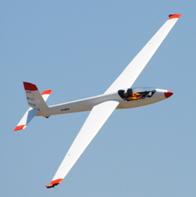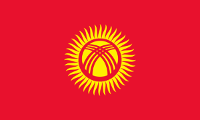Day 9: classes, cautionary contacts, subsonic sussurations
 Classes as usual today. I sat in on the third-year course today. Things look good there on the whole. One of the topics was means of transport, and one of the words mentioned was пла́нер. One of the teachers thought it meant "great big airliner," but to my memory it meant "glider," although to tell the truth, it had been so long since I've seen the word that I feared I might be mistaken. I got home and checked the dictionary, and, lo, the definition is «Безмоторный летательный аппарат тяжелее воздуха для планирующего или парящего полёта». Hah! Score one for the foreigner! I also know three different words for mucous in Russian. It's things like that we linguists build our self-esteem on.
Classes as usual today. I sat in on the third-year course today. Things look good there on the whole. One of the topics was means of transport, and one of the words mentioned was пла́нер. One of the teachers thought it meant "great big airliner," but to my memory it meant "glider," although to tell the truth, it had been so long since I've seen the word that I feared I might be mistaken. I got home and checked the dictionary, and, lo, the definition is «Безмоторный летательный аппарат тяжелее воздуха для планирующего или парящего полёта». Hah! Score one for the foreigner! I also know three different words for mucous in Russian. It's things like that we linguists build our self-esteem on.
 Today we had to do an emergency contact test as well, which is something required by our study abroad office. In the past I've pretty well always gotten in contact with all the students within an hour or two of starting, but alas not so today. It's already seven hours later and there are still two who I can't get in touch with; they have turned off their phones. There was also a set that was working out at the gym with their phones off. I fear I may not get them until the morning. Tomorrow I'll have to ask them to keep their phones on when they are not in class or working out.
Today we had to do an emergency contact test as well, which is something required by our study abroad office. In the past I've pretty well always gotten in contact with all the students within an hour or two of starting, but alas not so today. It's already seven hours later and there are still two who I can't get in touch with; they have turned off their phones. There was also a set that was working out at the gym with their phones off. I fear I may not get them until the morning. Tomorrow I'll have to ask them to keep their phones on when they are not in class or working out.
 All of this summer's instructors are women. In the fUSSR it is almost always the case that language teachers are women. I would like to see more men in the profession. The other day in the second-year class the students commented that it was tougher to recognize what male voices were saying, and I strongly suspect that has something to do with simple lack of classroom exposure. There is a certain timbre to Russian spoken with a male voice that I have never heard in men speaking English. I have occasionally wondered if there was something physiological there as well. Some Russian basses when singing can hit these incredibly deep notes that cause walls to tremble.
All of this summer's instructors are women. In the fUSSR it is almost always the case that language teachers are women. I would like to see more men in the profession. The other day in the second-year class the students commented that it was tougher to recognize what male voices were saying, and I strongly suspect that has something to do with simple lack of classroom exposure. There is a certain timbre to Russian spoken with a male voice that I have never heard in men speaking English. I have occasionally wondered if there was something physiological there as well. Some Russian basses when singing can hit these incredibly deep notes that cause walls to tremble.
Russian in Central Asia
One thing that is different about Russian in Central Asia, which is not at all surprising, is that you get all sorts of Central Asian words mixed in. Let me give you two examples.
In downtown Bishkek the roads are lined with trees. The trees make the city much more attractive than it would be otherwise, but let me tell you: there is not a ficus's chance in hell they could grow here without irrigation. It is way too dry. So the streets are lined with small irrigation channels that are called ары́ки. Now the word ары́к doesn't have a Slavic feel to it right off the bat, and in fact it seems to be derived from one of the Turkic languages, perhaps Kazakh or Turkish or Kyrgyz (though I haven't confirmed the word in Kyrgyz yet). The other day I was chatting with a Kyrgyz acquaintance and commented on the aryki, and I said that they didn't have them in Moscow or Petersburg. He commented that they did have them, it was just thaqt in those cities they were covered with grates. I think he is mistaken. True, there are grate-covered channels in Kazan and Moscow and Petersburg, but I think they are mostly for run-off, not for irrigation. In those other cities there is enough rain to support trees and grass without the channels.
The next example comes from the Russian Wikipedia article on арыки. It reads: «Для контроля за арыками в городах и сёлах назначают «арычных старейшин». В их роли обычно выступают старосты кишлаков, мирабы и городские и сельские общины.» The words кишлак and мираб are completely non-standard Russian, even though can find them in Russian dictionaries. They mean ‘village’ and ‘water boss’ respectively. But if you live in Central Asia you know these words, just like in Arizona you know words like ‘pueblo’ and ‘jefe.’
One last linguistic comment: the word мираб is quite interesting because it combines an Arabic root 'mir' meaning 'lord, master' and a Persion root 'ab' meaning water, which suggests that the Turkic languages borrowed it from Persian.
Day 10: classes, curricular comments, curious cuisine
Classes as usual. No great shakes, which is exactly what a group leader wants. One of our groups is off for a double-overnight excursion. I intended to go, but instead I'll be putting together some materials for our fourth-year instructors. Which is just as well... the traveller's bug still hasn't left me completely, which is odd.
Of course, not everything that seems a traveller's bug is necessarily a traveller's bug. One of our boys yesterday found a restaurant that served dog; it was delicious but is not sitting well with him. One of our girls ate a pound of peaches; that was more fiber than her system was expecting. (I remember the one time I ate an entire pound of grapes. I had a similar experience.)
Finding meaning: chapters 3 and 4
Chapter 3: I thought his description of projections was interesting, as well as the five stages one may go through with them.
Chapter 4: He discusses complexes a bit, and ends up talking about how we have to own them.
At this stage I'm thinking the book is sort of a paraphrase of Jungian analysis. So far I'm not finding it to give any self-insight that I have found from other sources.
A smell I could live without
Living in a hot city without air condition means you leave your windows open at night. This means sometimes you become quite aware when people are smoking outside.
<< 1 ... 24 25 26 ...27 ...28 29 30 ...31 ...32 33 34 ... 43 >>

